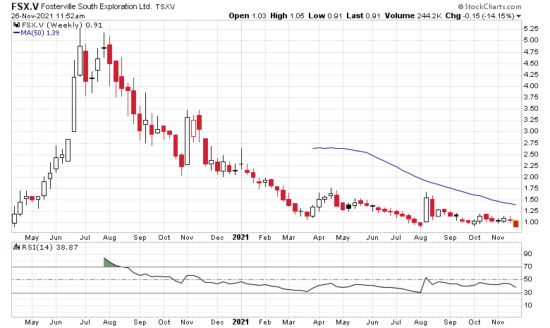| |||
Silly Season of Tax Loss SellingGeorge Lyttle In my previous blog, I outlined the extremes we have reached in both the general equity markets and the precious metal market. I also showed how clearly undervalued the precious metal stocks are relative to the price of both silver and gold. Now that we are at the end of November, we are now entering the annual tax loss silly season where individuals ignore values, and discard securities in order to exchange their current losses for tax savings. For some reason, most individuals hate paying taxes. Accountants feel obliged to suggest using this strategy every year as it’s an easy sell to help justify their fees. This provides tremendous opportunity for savvy investors to acquire excellent candidates for future gains. While it is not my intention to provide any specific recommendations on what securities one should purchase, a simple scan this week provides 23 candidates for consideration. The scan simply looks for precious metal securities currently trading below their 50-day moving average, and having a relative strength index greater than 30. One can scroll down the screen to see which companies show a divergence between their price activity and relative strength. This divergence is a sign of a potential change in direction of the security’s price movement which one might wish to take advantage of. (Click on image to enlarge) Here is an example of what I am highlighting in this article. Notice in the decline that FSX.V has had since August 2020. Notice how the RSI index continued to decline along with the security price until August 2021. The stock price has now moved back down to the previous low, however, the RSI has not returned to its low value. This is the type of divergence which may be signalling a bottom forming in the security price, and indicates that this candidate requires further investigation. This is one type of analysis our site encourages our students to look for. While we are on the subject of taxes, there are two stories I think are worth highlighting here. The first story comes from Joseph Granville when he worked as an analyst in the industry. One of his co-workers owned a large position in AMC Motors, and he asked Joe what his opinion on the stock was. Joe looked at the parabolic curve, which had gone vertical to $98, and said he should sell out his position. The co-worker explained he would have too big of a tax liability to do that, so he hung on. Within two years AMC stock had fallen from $98 per share down to less than $10. His friend no longer had a tax problem. The other story is a personal one. Back in the 1980s, Canada’s tax laws encouraged the movie production industry by offering tax incentives to finance movies produced in Canada. At the time this seemed like an interesting and good idea worth taking. I decided to invest $10,000 into a movie starring James Coburn. My objective was to screw the government by saving $5000 in taxes. Well, I reached my objective. I wrote off the entire $10,000, and screwed the government out of $5000 in taxes. The only problem was that the movie turned out to be a bust, and it cost me the whole $10,000 to save the taxes. I would have been far better off paying the taxes and keeping the difference. Since that experience, I have learned to be happy paying as much taxes as I possibly can, and in the years when I paid a lot of taxes I always seemed to have a lot of money left over. ### George Lyttle Disclaimer: This contents represents the opinions of George Lyttle. Nothing contained herein is intended as investment advice, or recommendations for specific investment decisions, and you should not rely on it as such. George Lyttle is no longer a registered investment advisor. Information and analysis above are derived from sources, and using methods believed to be reliable, but George Lyttle cannot accept responsibility for any trading losses you may incur as a result of your reliance on this analysis, and will not be held liable for the consequence of reliance upon any opinion or statement contained herein or any omission. Individuals should consult with their broker and personal financial advisors before engaging in any trading activities. Do your own due diligence regarding personal investment decisions. |

